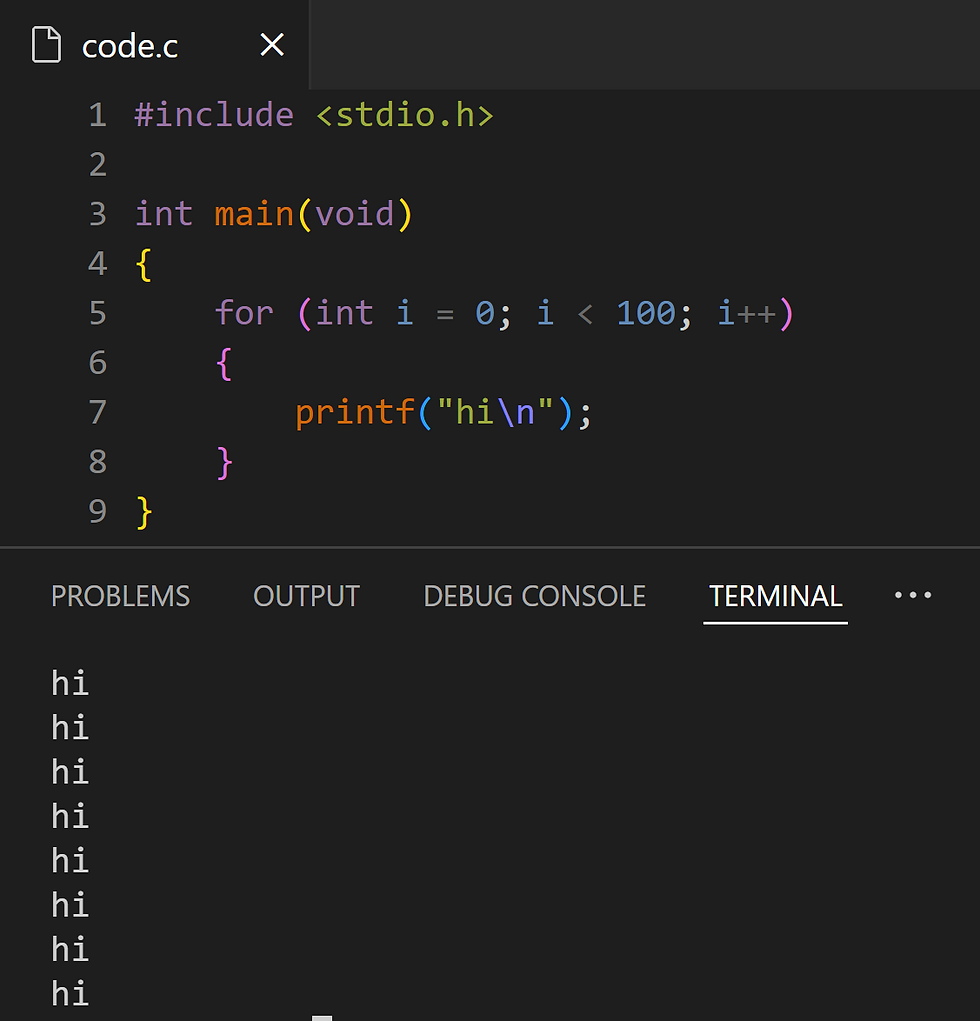Introduction
Say I wanted to print a message to the terminal 100 times. I could copy-paste this statement again
printf("hi\n");again...
printf("hi\n");and again...
printf("hi\n");But as you can imagine, this gets tedious quickly.
Luckily, C and most other programming languages come equipped with loops, which simply repeat lines of code a number of times, thereby reducing redundancy and improving design.
Let's take a closer look at the various types of loops in C, and how they might differ from other programming languages you may have encountered.
while
while (boolean-expression)
{
...
}Code within the loop is repeated an indefinite number of times until the boolean expression evaluates to false.
For instance, if I wanted to count up from 1 to 100, its while loop form could look something like this:
int x = 1;
while (x <= 100)
{
printf("%i\n", x);
x++;
}In this case, the boolean expression is x <= 100, which comes out to false once the variable x reaches 101.
Similarly, I could make a loop run forever by using true as a boolean expression, which is always... true.
do-while
do
{
...
}
while (boolean-expression);This strain of a while loop only exists in languages like C and C++, and can come in useful when you need to execute some code (usually to get the value of a variable) to then check that variable just defined in the while statement.
For instance:
do
{
int x;
scanf("%d", &x)
}
while (x < 0);Here, we check for user input, and using the value stored in x, we determine whether it is negative. If so, the loop continues; if not, the loop breaks.
If we had used a traditional while, an error would be thrown as the variable x would not be initialized.
An alternative to the do-while would be simply getting user input above the while, though this would result in redundant code:
int x;
scanf("%d", &x)
while (x < 0)
{
// scanf() called for the second time
scanf("%d", &x)
}for
for (initialize-variables; condition-repeatedly-checked; increment)
{
...
}For loops are definitely syntactically weirder than the other types, but can come in handy when repeating lines of code a definite number of times.
For instance:
for (int i = 0; i < 12; i++)
{
printf("hi\n");
}first, the variable i was initialized to 0
second, the condition checked again and again was if i < 12
third, each time the loop runs, i is incremented by 1 (i++)
You can even define multiple variables, conditions, and increments:
for (int i = 0, int j = 11; i < 12 && j >= 0; i++, j--)
{
printf("%i %i\n", i, j);
}Final Thoughts
As a final review:
while
used to repeat a block of code an indefinite number of times, but possibly zero times
do-while
used to repeat a block of code an indefinite number of times, but at least once
for
used to repeat a block of code a definite number of times
Hopefully now you won't need to resort to copy pasting...
Thanks for reading!

Comments